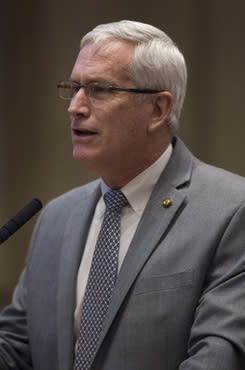Alabama Lawmakers Delay Vote on Compensation to Freed Death Row Inmate
[caption id="attachment_7193" align="alignright" width="245"]


Alabama state Sen. Paul Bussman, R-Coleman (Photo: Albert Cesare/The Montgomery Advertiser via AP)[/caption] An Alabama Senate committee on Wednesday delayed a vote on whether to award compensation to a man freed after spending nearly three decades on death row. That delay came as the state finance department and attorney general's office argued over whether he was never proven innocent. Sen. Paul Bussman, R-Cullman, has proposed legislation to grant Anthony Ray Hinton $1.5 million over three years. Hinton was freed in 2015 after spending 28 years on death row for two 1985 murders that occurred during separate robberies of fast-food restaurants in Birmingham. Crime scene bullets were the key physical evidence that prosecutors said linked Hinton to the scenes. The U.S. Supreme Court ruled that Hinton's defense was so deficient that it was unconstitutional. Prosecutors dropped plans for a second trial when state forensic experts couldn't link crime scene bullets to a gun found in Hinton's home. Bussman said the state system, which appointed Hinton's lawyer, did not work fairly. He said he was also concerned that Hinton has been unable to get money through an existing process to compensate the wrongly incarcerated. "I'm very concerned that people in the state of Alabama who are low-income or of poverty level, they do not get the same judicial care even though justice is supposed to be blind. If you don't have a good lawyer, you are going to be [in] trouble," Bussman said. Senators, in delaying the bill, said they wanted to defer to a separate process for providing money to the wrongfully incarcerated. However, the state Finance Department has opposed giving any money to Hinton. A Finance Department lawyer wrote in a Jan. 22 email to legislators that Hinton's conviction was vacated because of ineffective counsel, and not "due to innocence," so their conclusion is that "Mr. Hinton is ineligible for compensation." The state attorney general's office argued Wednesday that Hinton was not exonerated. "To say that Mr. Hinton was exonerated is a gross exaggeration of the facts of this case," Deputy Attorney General James Roy Houts told the committee Wednesday. Houts said the ballistic testing was inconclusive. Bussman countered that Hinton is presumed innocent under law. "The way I understand America, and the way I understand Alabama, is you are innocent until proven guilty. And when you are not proven guilty, you are innocent," Bussman said. Finance and Taxation Committee Chairman Trip Pittman said he was open to bringing the bill back if legislators feel differently after reviewing the case. Since his release, Hinton has spent time on the speaking circuit discussing the justice system and wrongful incarceration "They had every intention of executing me for something I didn't do," Hinton said when he walked out of the jailhouse in 2015.

